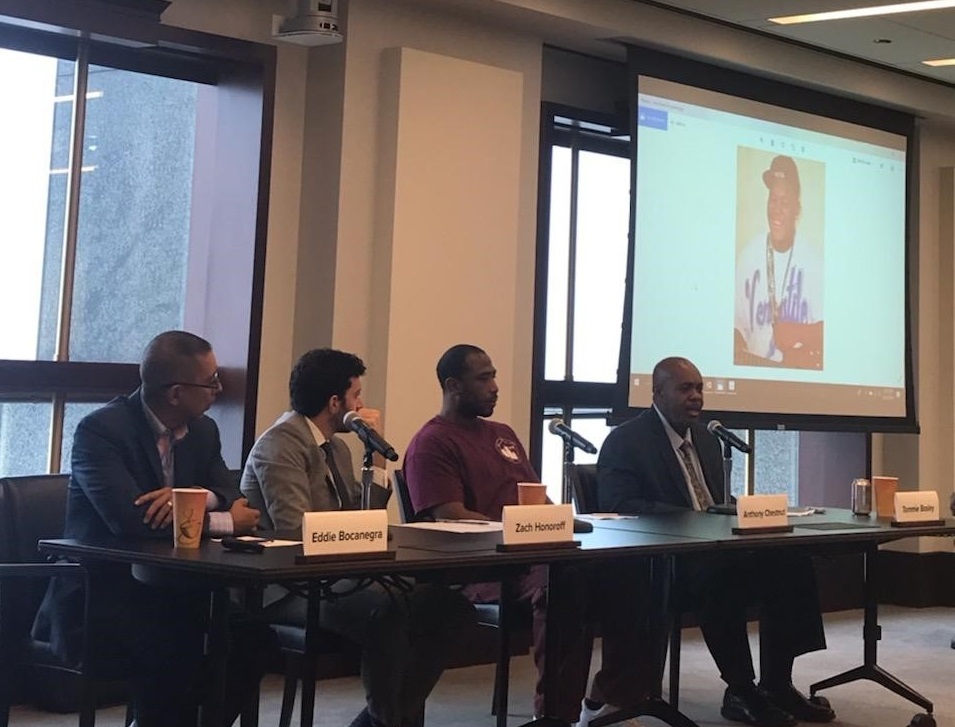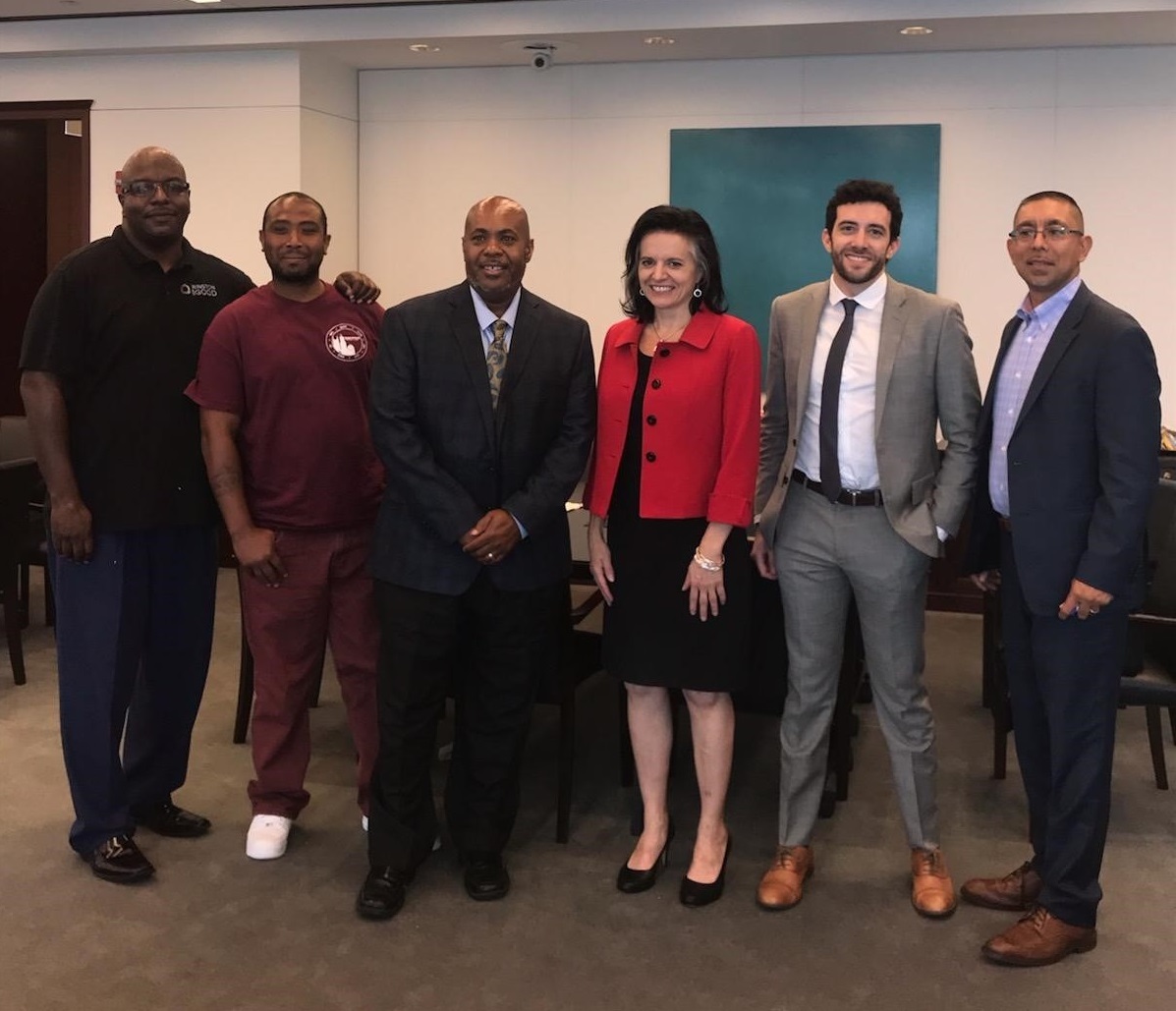Blog
Gun Violence Awareness Panel Aims to Change Perceptions and Save Lives
Blog
September 23, 2019
Winston for Good hosted a Lunch & Learn on September 16 for an important discussion about gun violence in the City of Chicago. The intent of this program was to bring attention to the staggering toll in the city as well as the promising strategies being implemented to reduce it.
“Gun violence affects us personally, our community, and our city, and it’s a really complex issue,” Office Managing Partner Linda Coberly said. She welcomed the 85+ attendees and introduced the panel of leaders, supporters, and participants in READI Chicago, a program of Heartland Alliance where Linda has been a long-time board member. “Engaging directly with individuals at risk and providing them with alternatives is really important work.”

Eddie Bocanegra, Senior Director of READI Chicago, led off the program with a story about a 13-year-old boy growing up in Little Village who witnessed a gun homicide, was arrested many times during his teen years, and served 14 years in prison for a gang-related murder. That boy was Eddie. “There’s a connection between people who are impacted by violence and people who are addressing these issues” in our city. He described READI Chicago’s use of data and research to identify individuals at highest risk of gun violence and its program that provides paid transitional jobs, cognitive behavioral therapy, and support services to these individuals. “Our primary goals are reducing violence, creating legitimate pathways, and offering long-term opportunity,” Eddie explained.
The University of Chicago Crime Lab, represented on the panel by Research Manager Zach Honoroff, partners with READI and other organizations and agencies to help identify, design, and test evidence-based interventions. Zach presented the statistics and complexities of gun violence in Chicago, noting the considerable progress made in the last two years and the challenges of racial and economic segregation and easy access to guns unique to the city. Heartland created the READI program in response to data showing that the existing social services response did not meet the needs of those at the highest risk for gun violence—young men age 18-24, Zach explained. “What the data does not show is the pervasive effect of the pain felt by the family and friends of gun violence victims that reverberates through the community.”
Anthony Chestnut, a participant in READI Chicago, has been affected by and participated in gun violence and is now part of the change. He told attendees that he grew up in a housing project, had only drug dealers to look up to, and recently finished 22 years in prison. “I played a part in being violent and I paid my debt to society, but to be 16 and grow up in prison, you don’t get taught how to transition back into society,” he said. “Better role models and more opportunities could have kept me out of gun violence.”
One such role model dedicated to breaking the cycle is Tommie Bosley, who lost his son Terrell, a local church musician, to gun violence. When Tommie and his wife, Pamela, got the phone call that Terrell was caught in crossfire outside of his church, he told attendees, “we decided right then and there that we were going to do everything we possibly could to help other families avoid this type of situation.” Tommie left the banking profession and went to work for Strong Futures, a violence intervention program at St. Sabina church that helps 18- to 24-year-old men and women with criminal backgrounds to find full-time jobs. “Job opportunities combined with intense mentoring has made a difference,” Tommie said. “But before you can even get to the workforce development part of the program, you have to establish a relationship with the young men and women and show that you genuinely care.”

Winston Senior Paralegal Ken Berry, who moderated this program, also has had an integral role in advocating for gun violence reduction in Chicago. Among his many community outreach efforts, he recently told his story as a guest speaker at the 3rd Annual Darren B. Easterling Center for Restorative Practices “We Are More” reception.
Ken asked the four panelists to tell attendees one thing they can personally do to make a difference:
Tommie asked attendees to communicate their individual skill to someone from a background different from their own. “If you can just engage in conversation with an individual, you can actually save a life just by being yourself and exposing that person to your talent.”
Anthony backed that up by urging attendees to have a conversation before you judge someone who has a criminal background. “You can have an impression of someone, but when you have a conversation with them your whole perception can change.”
“There’s a lot of noise out there about the gun violence problem and what actually works,” Zach said. “Just try to understand what is actually happening and talk to folks who might be able to sift through the noise.”
Eddie asked attendees to imagine what it would be like if their child was born to and cared for by someone in a disadvantaged neighborhood. “What would you want for them?”
This entry has been created for information and planning purposes. It is not intended to be, nor should it be substituted for, legal advice, which turns on specific facts.
